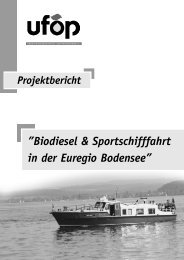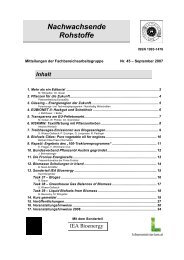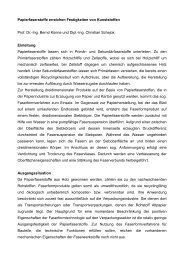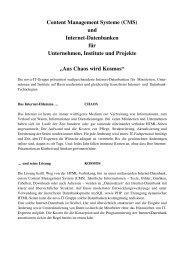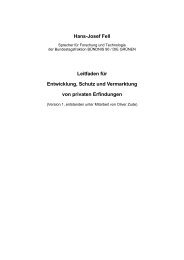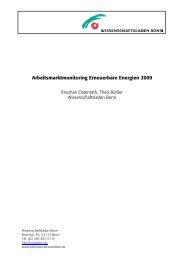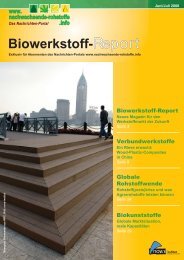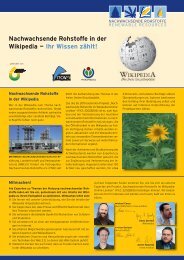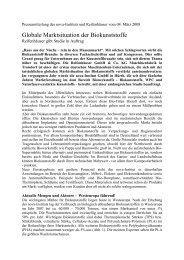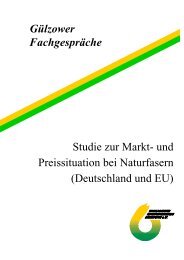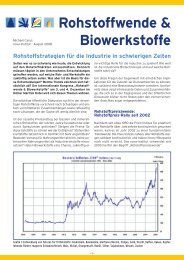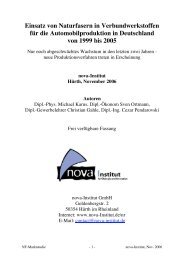Nachwachsende Rohstoffe - nova-Institut GmbH
Nachwachsende Rohstoffe - nova-Institut GmbH
Nachwachsende Rohstoffe - nova-Institut GmbH
Sie wollen auch ein ePaper? Erhöhen Sie die Reichweite Ihrer Titel.
YUMPU macht aus Druck-PDFs automatisch weboptimierte ePaper, die Google liebt.
12. Kurz gemeldet<br />
<strong>Nachwachsende</strong> <strong>Rohstoffe</strong> Nr. 43 – März 2007<br />
Action plan for energy efficiency: saving 20 % by 2020:<br />
As a major step toward meeting the unprecedented energy challenges facing the EU, the<br />
European Commission presented its Energy Efficiency Action Plan on 19 October 2006. The<br />
Plan contains a package of priority measures covering a wide range of cost-effective energy<br />
efficiency initiatives. These include actions to make energy appliances, buildings, transport<br />
and energy generation more efficient. New efficiency standards, promotion of services,<br />
specific financing mechanisms to support more energy efficient products are proposed. The<br />
Commission will furthermore set a Covenant of Mayors of the most pioneering cities in<br />
Europe and will propose an international agreement on energy efficiency.<br />
The Action Plan, which will be implemented over the next six years, is in response to the<br />
urgent call from Heads of State and Government at the Spring European Council this year for<br />
a realistic Energy Efficiency strategy. The Plan underlines the importance of minimum energy<br />
performance standards for a wide range of, and for buildings and energy services. In<br />
combination with performance ratings and labelling schemes standards represent a powerful<br />
tool for removing inefficient products from the market, informing consumers and transforming<br />
the market to make it more energy efficient. Minimum performance requirements for new and<br />
re<strong>nova</strong>ted buildings will be developed. Very low energy consumption buildings (or passive<br />
houses) will also be promoted.<br />
Website: ec.europa.eu/energy/action_plan_energy_efficiency/index_en.htm<br />
Source: www.managenergy.net/news/news.html<br />
Lignocellulosic ethanol pilot plant conducts first enzymatic hydrolysis trials<br />
The first trials of a new approach for the production of ethanol from lignocellulose have taken<br />
place at a pilot plant in November at Örnsköldsvik in Sweden. The plant (owned by two<br />
Swedish universities), is central to a study funded by the EU, the “NILE” project. The study<br />
aims to extend the range of sources from which ethanol may be made beyond sugar cane,<br />
sugar beet and corn to materials that are less expensive, result in fewer greenhouse gas<br />
emissions and do not compete for land with food crops. Typically, they include straw, soft<br />
woods (like spruce), and wood residues.<br />
Having previously used dilute acid to break down the lignocellulose, the “SEKAB” team has<br />
now tested enzymatic hydrolysis, which promises a greater yield at lower cost. “Enzymatic<br />
hydrolysis poses many challenges and our main goal is to have a complete and robust<br />
process” explained Maria Edlund, the co-ordinator of the NILE project. “It’s early days yet.<br />
Our next trial run will take place in March 2007.<br />
This progress in the NILE project comes in at a time when the US has increased its rhetoric<br />
on biofuels. Al Hubbard, director of the National Economic Council and top economic adviser<br />
to the Bush administration told the Financial Times that a “huge opportunity” existed for<br />
cellulosic ethanol, which could ultimately provide five times the quantity of fuel derived from<br />
corn. The administration has earmarked 250 Mio. US$ of research funds for the area. Royal<br />
Dutch Shell and BP are each in partnership with companies to develop the technology.<br />
More about: www.nile-bioethanol.org/doc/PR_NILE_05Dec06.pdf<br />
Source: Katharina Krell, EUREC Agency, E-Mail: krell@eurec.be<br />
15



